How
to Find Your Ikigai
A
Japanese Way to Find Your Life Worth Enjoying
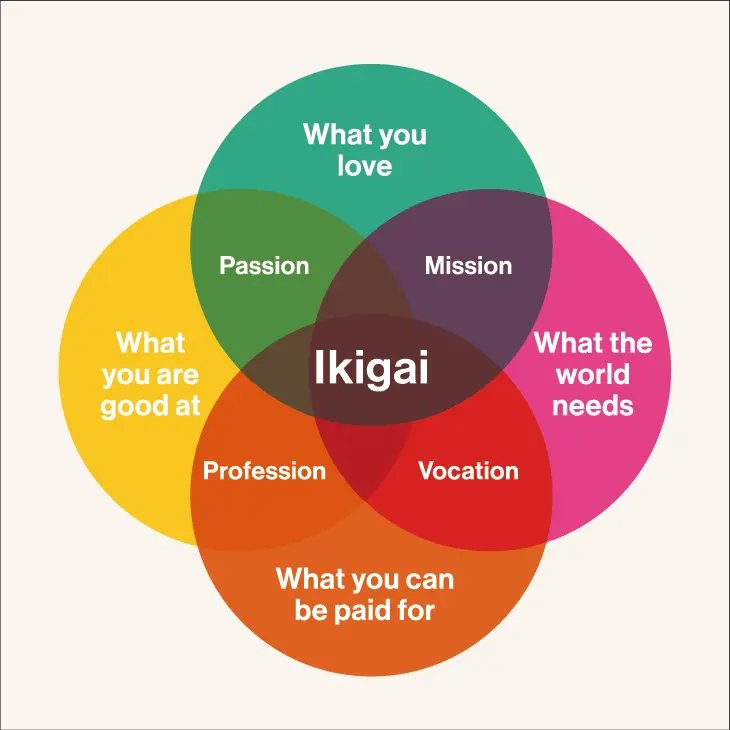
Introduction to Ikigai
The journey to finding one's own Ikigai is deeply personal. Others may not help you much.
As I embarked on this quest, I wanted to uncover not just what brings me joy, but also what gives my life a deeper meaning.
Ikigai is a Japanese term that means "reason for being."
I have been working in the process improvement industry for several years with big companies.
I have tried many improvement methods including Six Sigma on personal lives as well.
All have their own methods and do help to some extent.
But hands down, the simplicity of Ikigai has just amazed me beyond my imagination.
Background and History of Ikigai
The concept of ikigai has its roots in Japanese culture and can be traced back to the Heian period (794-1185).
The term itself is a combination of two Japanese words: "iki" (life) and "gai" (worth or value).
While the exact origin of the concept is unclear, it has been an integral part of Japanese society for centuries.
Traditionally, ikigai was closely tied to one's role in society and the contribution an individual made to their community.
In ancient Japan, this often meant fulfilling one's duties to family, clan, or profession.
As Japanese society evolved, so did the interpretation of ikigai, becoming more individualized and personal.
The island of Okinawa, known for its high concentration of centenarians, has been particularly associated with the concept of ikigai.
Okinawans often credit their longevity and well-being to having a strong sense of purpose in life, which they refer to as their ikigai.
What is Ikigai? I asked
When I first came across the concept of Ikigai, I was intrigued.
It seemed to provide a holistic purpose, blending personal passion with societal contribution.
At its core, Ikigai is the confluence of four core elements:
what you love,
what you're good at,
what the world needs, and
what you can be paid for.
This convergence is where true purpose lies.
Unlike the Western notion of career-centric purpose, Ikigai embraces a comprehensive approach, integrating personal joy with professional ambition.
It's about finding that intersection where your skills and passions meet genuine opportunities and societal needs.
As I dived deeper, I saw it was about creating a life of balance and harmony, aligning my daily actions with my deeper aspirations.
The Japanese Concept of Ikigai
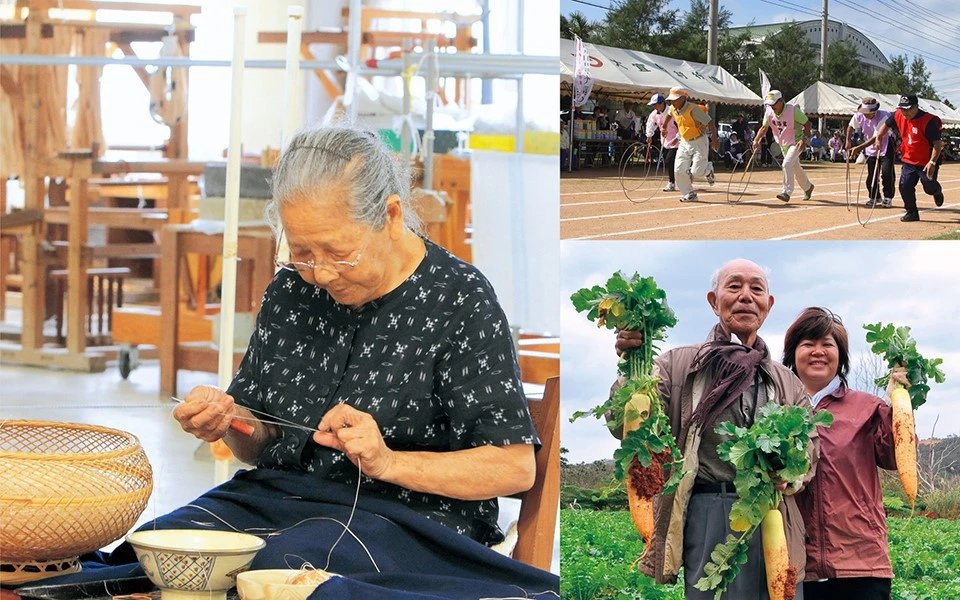 Japanese people spending Ikigai life
Japanese people spending Ikigai lifeUnderstanding the cultural backdrop of Ikigai opened my eyes to its depth.
Originating from Okinawa, Japan, a region known for the extraordinary longevity of its inhabitants, Ikigai is more than just a personal quest; it's woven into the fabric of community living.
It emphasizes the importance of social connections and communal well-being, contrasting sharply with individualistic Western ideals.
In Japanese society, one's Ikigai often relates to their role within the community, highlighting the profound impact of collective purpose.
This communal aspect of Ikigai fosters a sense of belonging and shared contribution, offering insights into how communal purpose and individual goals can harmonize.
Contemplating this, I saw how Ikigai encourages us to see purpose as both an internal journey and an external practice.
Ikigai Philosophy
Delving into the philosophy of Ikigai taught me to view life through a lens of mindfulness and intentionality.
The history of Ikigai is also rooted in Zen Buddhism, emphasizing simplicity, balance, and the importance of the present moment.
It encourages living with awareness on daily basis, where each action is aligned with a deeper sense of purpose.
The principles of Ikigai stress a harmonious existence, where stress and distractions are minimized, allowing true passions to emerge.
This alignment of daily habits with core values cultivates a mindful lifestyle, promoting mental tranquility and clarity.
I realized the power of integrating Ikigai philosophy into my life when I started practicing mindfulness.
I began to see everyday tasks not just as mundane routines, but as opportunities for fulfillment and personal growth.
Ikigai is a Japanese concept, a lifestyle that strives to balance the spiritual with the practical.
This approach to life speaks to the truth that happiness can only be obtained when we live in the moment, while also planning for the future.
Answering
Four Big Questions in Ikigai
In modern Japan, ikigai continues to play a significant role in people's lives, though its interpretation and application have been adapted to contemporary society.
Answering the Four big questions is the key in Ikigai.
1. What you love
2. What you're good at
3. What the world needs
4. What you can be paid for
Finding the intersection of these four elements is considered the ideal state of ikigai.
It is crucial to understand that finding your Ikigai is a journey, not a destination.
The aim is to harmonize these four aspects, seeking fulfilment, satisfaction and meaning in life.
Originality of Japanese Ikigai is its non-commercial
spirit
It is important to note that ikigai doesn't necessarily have to be tied to one's career or financial success.
It can be found in various aspects of life, including hobbies, relationships, or community involvement.
In Japan, the concept is often discussed in schools and workplaces as a way to promote well-being and personal growth.
Many companies encourage employees to find their ikigai within their work, believing that this leads to increased job satisfaction and productivity.
Ikigai in the West
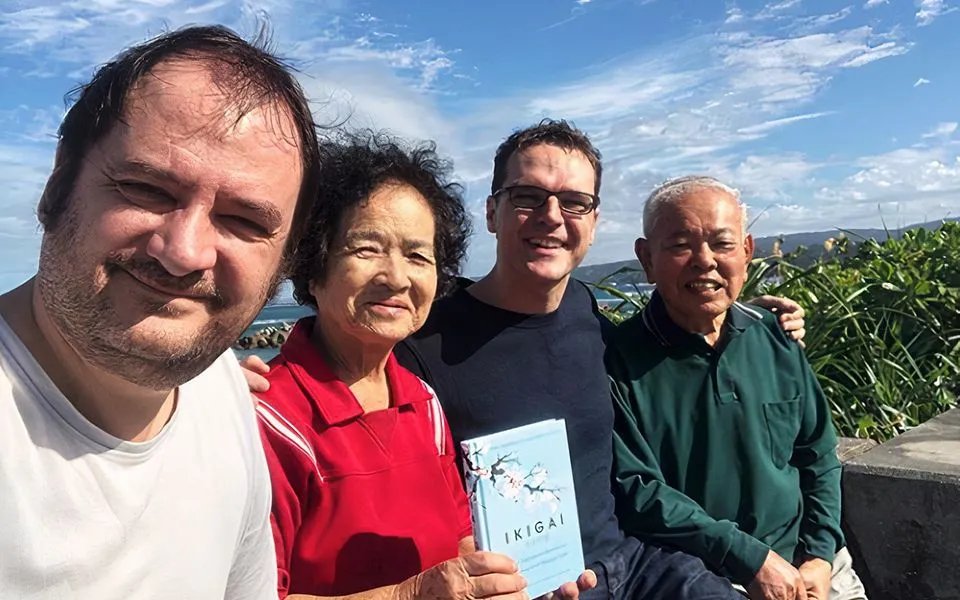 Ikigai Book Authors in Japan
Ikigai Book Authors in JapanThe concept of ikigai has gained considerable popularity in Western countries in recent years, particularly in the fields of personal development and positive psychology.
This surge in interest can be attributed to several factors:
1. Books and media: Publications like "Ikigai: The Japanese Secret to a Long and Happy Life" by Héctor García and Francesc Miralles have introduced the concept to a wider audience.
2. Wellness trends: As Western societies increasingly focus on holistic well-being, ikigai has been embraced as a tool for achieving balance and purpose in life.
3. Work-life balance: In a world where burnout is becoming increasingly common, ikigai offers a framework for finding meaning both in and outside of work.
4. Mindfulness and self-reflection: The introspective nature of ikigai aligns well with the growing interest in mindfulness practices in the West.
In Western interpretations, ikigai is often presented as a Venn diagram with four overlapping circles representing passion, mission, vocation, and profession.
This visual representation has become popular in self-help literature and corporate workshops.
Understanding the Ikigai Diagram and Its Meaning
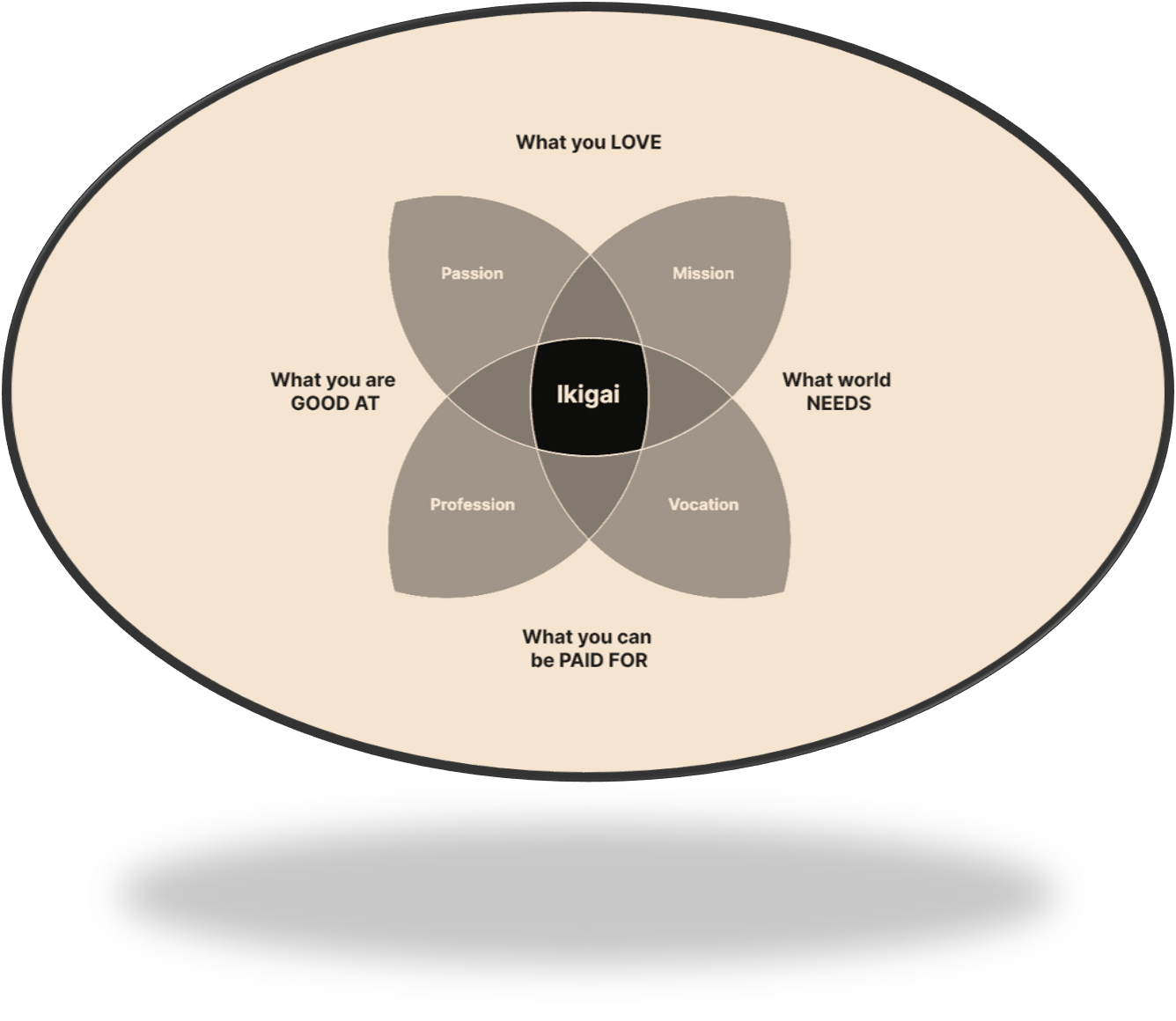 Ikigai circles simplified
Ikigai circles simplifiedThe Ikigai diagram is represented by four overlapping circles, each representing a fundamental aspect of life - what you love (your passion), what the world needs (your mission), what you are good at (your vocation), and what you can get paid for (your profession).
The intersection of all four circles is your Ikigai.
However, it's worth noting that this interpretation is somewhat over simplified compared to the nuanced understanding of ikigai in Japanese culture.
Critics argue that the Western adoption of ikigai sometimes overemphasizes career and financial aspects, whereas the original concept is more holistic and can apply to various areas of life.
Discovering Your Ikigai
Discovering your Ikigai requires introspection, commitment, and patience.
The potential rewards are substantial: a more fulfilling life, improved mental health, and profound satisfaction.
As you read on, picture yourself peeling off the layers of your personality uncovering the deeper passion and purpose at your core.
The process of discovering my Ikigai started with an internal dialogue about my passions.
I asked myself questions:
What brings me joy?
What activities make me forget the world?
Identifying these passions was the first step.
Then, I examined my strengths and how they aligned with opportunities around me.
Creating a Venn diagram like above helped visualize that.
I jotted my passions, skills, needs of the world, and potential payment opportunities.
Encouraged by this exercise, I realized my Ikigai was at the intersection of writing, coaching, music and filmmaking.
Finally, I primarily selected writing and coaching. And secondary music and filmmaking.
Whereas I have been involved in the corporate sector for 30+ years in Operations, HR, IT, Marketing and Communications.
Then I wondered why out of all I excelled better at Communications.
It came naturally to me and I liked it too.
This process was revealing, not just in terms of identifying concrete elements of my Ikigai, but also in understanding how to serve both myself and the wider community in meaningful ways.
Finding Purpose with Ikigai
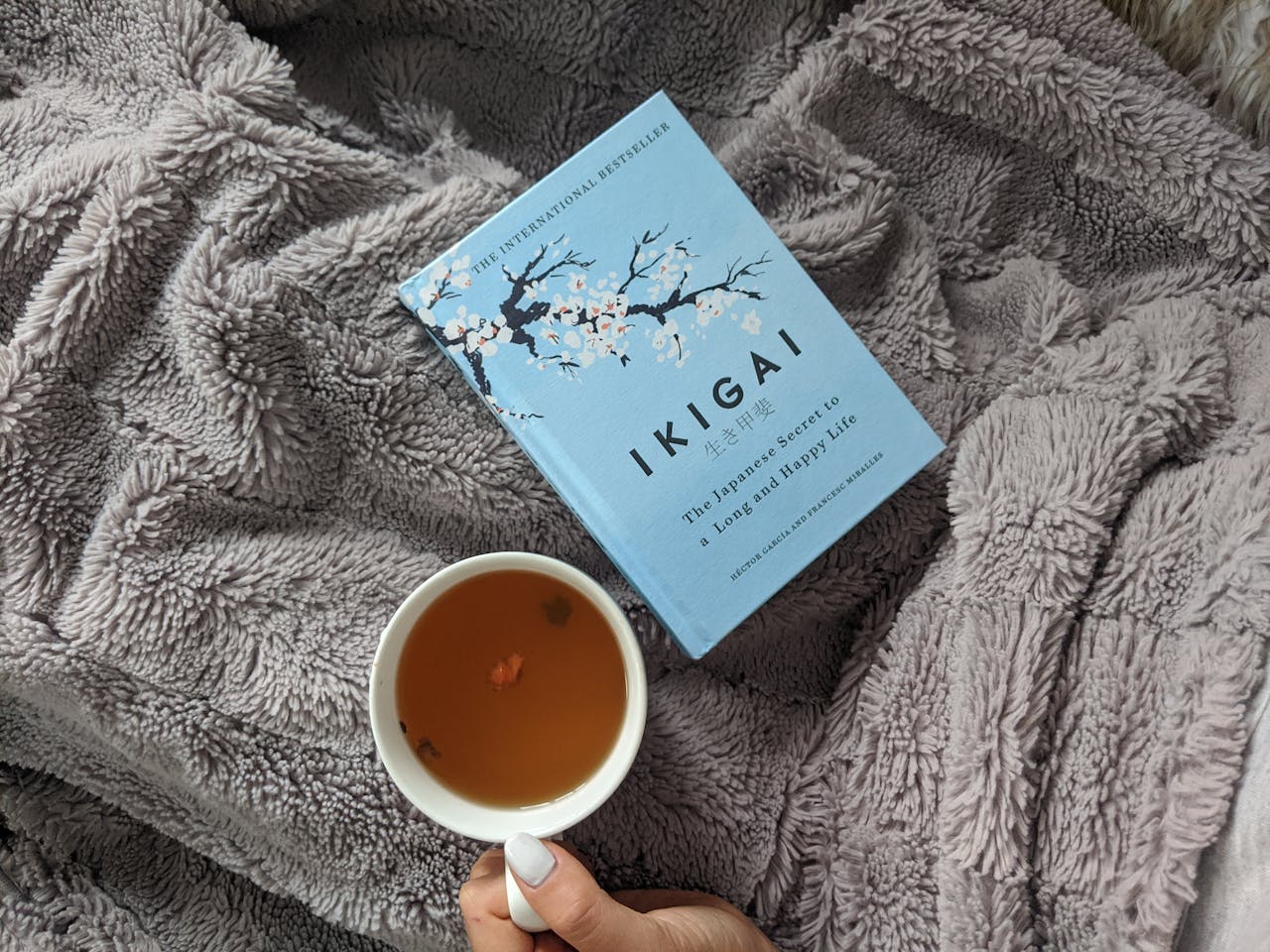 Ikigai Book Image and Green Tea
Ikigai Book Image and Green TeaTo find meaningful purpose through Ikigai, it was essential to stick to the four questions.
It will lead you to discover the underlying beliefs and align actions with a greater purpose.
Setting tangible goals, after getting the answers to the four questions, helps bridge the gap between the current state and desired life.
Ikigai becomes particularly significant during life transitions, providing a compass when direction is unclear.
For instance, when considering a career change, aligning new opportunities with my Ikigai ensured consistency with my life's purpose.
Acknowledging and embracing periods of uncertainty, while focusing on my true passions and values, turned daunting transitions into opportunities for personal growth and fulfillment, affirming Ikigai as a reliable guide in navigating life's complexities.
You can also read another article on Ikigai to learn more.
Benefits of Ikigai
Embracing Ikigai brought numerous benefits that drastically improved my mental well-being.
It fostered a sense of purpose that diminished existential anxieties and made everyday tasks feel more meaningful.
With a clear vision of what matters most (writing and coaching) I found heightened motivation and laser focus.
This clarity of purpose also extended to my social interactions, where aligning my values with those around me led to deeper and more meaningful connections.
This heightened sense of belonging and understanding increased positive energy in both personal and professional environments.
It proved that living with Ikigai mental framework was transforming life's simple moments into seeds of genuine happiness and fulfillment.
Ikigai and Career Satisfaction
One significant area where Ikigai profoundly impacted me was in my career.
By aligning my professional path with personal passions, I embarked upon my own selected personal work which became a source of joy rather than a daunting obligation.
This shift in mindset led to greater work satisfaction and productivity, as I was fueled by genuine interest rather than mere necessity.
Long-term, this alignment promised a career trajectory filled not just with external success, but with intrinsic fulfillment.
Embracing Ikigai in my professional life revealed that work, when intertwined with passion and purpose, becomes a joyous part of a meaningful existence.
Living an Ikigai Life
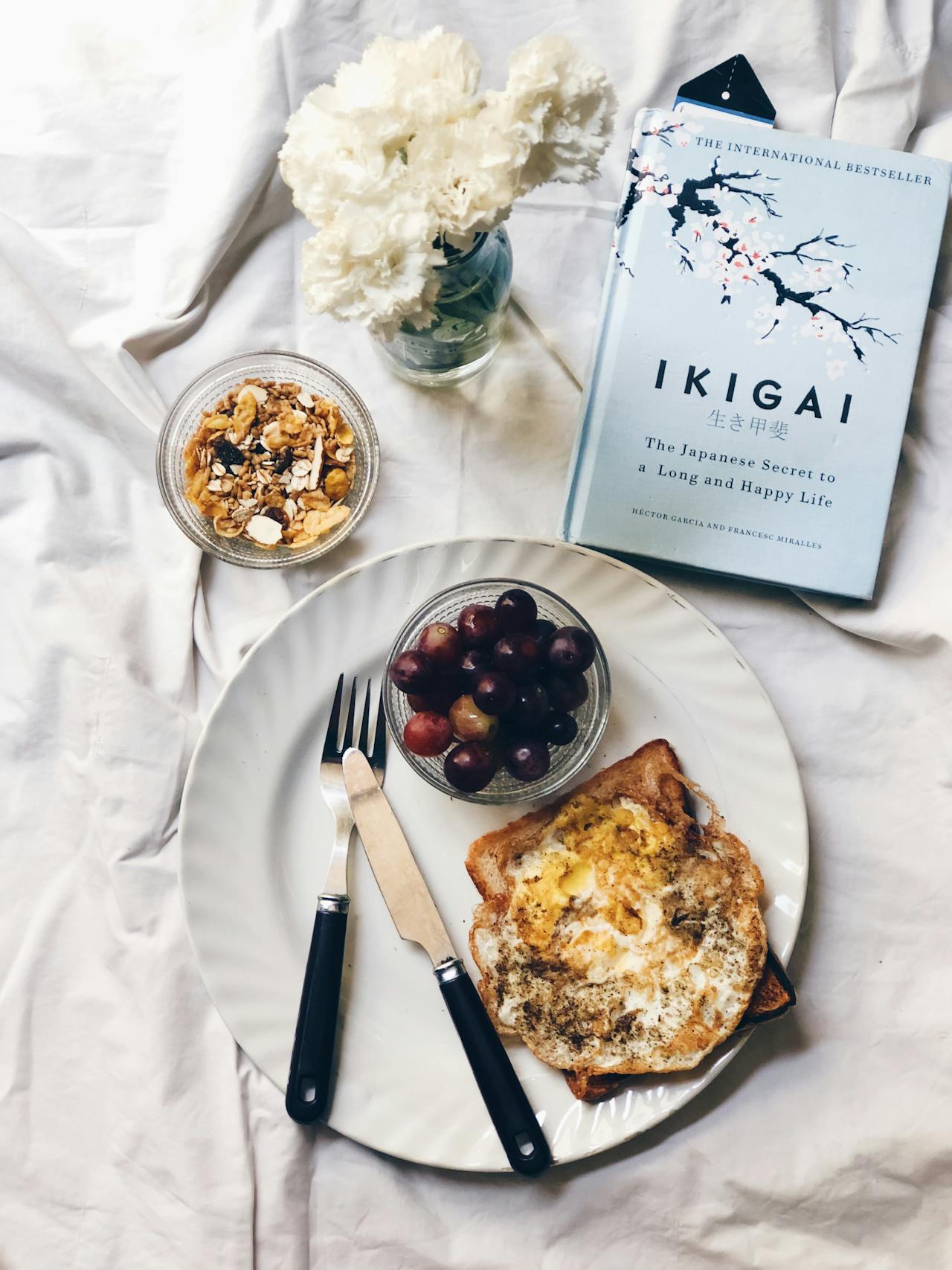 Ikigai Book on laid down Dinner Table
Ikigai Book on laid down Dinner TableLiving an Ikigai-centered life involves daily habits that nurture authenticity and true purpose.
It begins with morning reflections, setting intentions aligned with my Ikigai, ensuring my actions contribute to a greater purpose each day.
Challenges, like societal pressures or self-doubt, tested my commitment to living authentically.
It still does. But that is Okay.
Eventually, you learn to live with it every day, and it becomes your second nature.
Stories of individuals who successfully integrated Ikigai into their lives served as inspiration.
For instance, knowing about a local budding young music band who turned their passion into a thriving community project reminded me that a life centered around Ikigai not only enriches the individual but also benefits the broader community.
Ikigai Japanese Secret
Exploring the Japanese secret of Ikigai revealed a profound connection between purpose and longevity.
I learned that longevity isn't just about physical health, but mental and emotional well-being, too.
The Japanese, by living with Ikigai, often experience a life rich in fulfillment and joy.
Their daily practices—ranging from eating nutritious foods to maintaining social networks—are infused with a sense of purpose.
These lessons encouraged me to adopt lifestyle habits that foster balance and joy, aspiring to create a life that resonates with my deepest values.
Applying these insights in a broader context allows for a richer understanding of a fulfilling, purposeful life that transcends cultural and geographical boundaries.
Conclusion and Next Steps
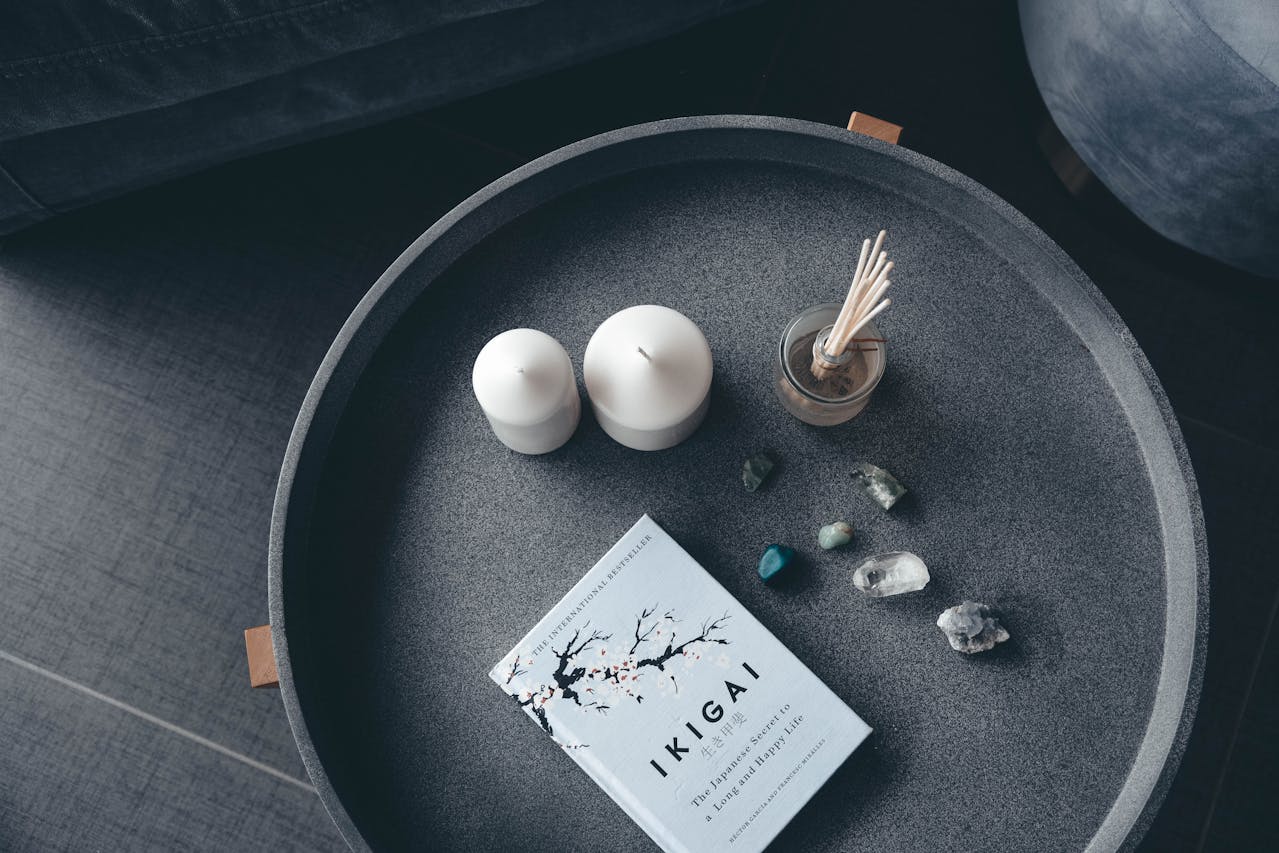 Ikigai Book in a Artistic Setting
Ikigai Book in a Artistic SettingReflecting on the journey of discovering Ikigai, I realized it's a lifelong pursuit filled with valuable insights.
It involves not just locating that sweet spot where passion, skills, community, and monetization, intersect but also continuously nurturing it.
Building a sustainable Ikigai practice involves regular reflection and adjustments, ensuring that life's changes and challenges are embraced as opportunities for growth.
To conclude, I feel excited about continuing this journey—not alone, but potentially inspiring others to seek their own Ikigai.
Whether it's through subtle shifts in daily habits or major life overhauls, integrating Ikigai promises a life where each moment becomes both meaningful and fulfilling.
Though it may not promise you great riches in many cases, but it will truly connect you with yourself and what God made you for - to perform in this world.
You are just a character already with a written script.
You need to find that character, get into it and own it.
Ikigai is one of the simplest tool and method I could find so far to help you with that.
Wishing you a very best journey in your Ikigai.
Brief Summarized Presentation of Ikigai

Zeerik ahmad - Founder, Author & Publisher
Certified Six Sigma Black Belt & Marketing Communications Coach
IdeasBeat is an emerging eMagazine and a Multimedia Publishing House where we hunt for diverse ideas and stories from around the world with a key focus on personal and professional growth.
You can contact us here